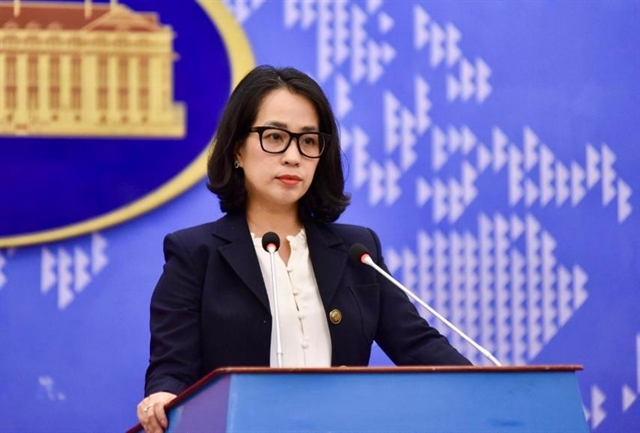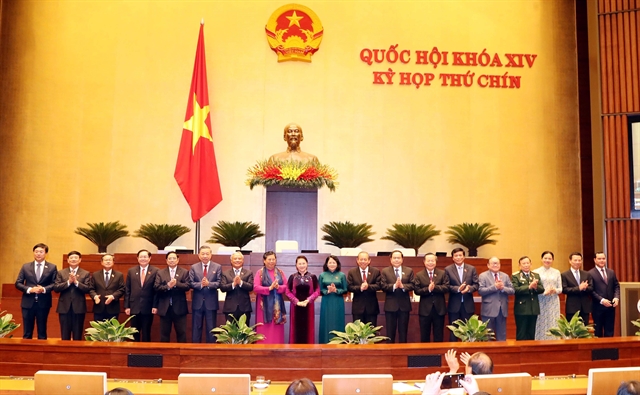 Politics & Law
Politics & Law

The 14th-tenure National Assembly (NA) passed a resolution on the morning of June 12 ratifying the Vice Chairpersons and members of the National Election Council, with 92.96 per cent of the deputies voting in favour.

|
| The National Election Council makes its debut. — VNA /VNS Photo Hữu Sàng |
HÀ NỘI — The 14th-tenure National Assembly (NA) passed a resolution on the morning of June 12 ratifying the Vice Chairpersons and members of the National Election Council, with 92.96 per cent of the deputies voting in favour.
The council comprises four Vice Chairpersons and 16 members. The Vice Chairpersons are Politburo Member and NA Vice Chairwoman Tòng Thị Phóng, Politburo Member and Deputy Prime Minister Trương Hoà Bình, Secretary of the Party Central Committee and President of the Việt Nam Fatherland Front Trần Thanh Mẫn, and Member of the Party Central Committee and Vice State President Đặng Thị Ngọc Thịnh.
Those in the council then presented themselves in front of the parliament before the meeting.
NA Chairwoman Nguyễn Thị Kim Ngân, who was elected Chairperson of the council on Thursday, stressed the significance of the election of deputies to the 15th legislature and all-level People’s Councils for 2021-26 to the operation of the State apparatus from the central to grassroots levels, especially the institutionalisation of resolutions to be adopted at the coming 13th National Party Congress and Party Congresses at all levels.
On behalf of the council, she pledged to closely coordinate with relevant agencies and organisations to perform tasks as defined in the Constitution and laws.
Also on Friday morning, 93.37 per cent of the deputies agreed to ratify a resolution on the election of a member of the NA Standing Committee.
Special mechanisms
The same day, the NA had a plenary session to discuss the draft resolution on a number of special finance and budget mechanisms and policies for Hà Nội.
If approved, the resolution would allow Hà Nội, on a pilot basis lasting five years, to establish new fees and charges outside of existing ones applicable throughout the country, or to raise the level of current fees, in a bid to enlarge its budget for priority projects.
Other special mechanisms afforded to Hà Nội’s authorities include using whatever amount of the leftover budget from its salary reforms or regular expenditure to invest in socio-economic infrastructure, especially building or upgrading facilities for fire prevention purposes, waste treatment, or water supply and drainage.
During the plenary discussion, most deputies agreed that the capital city would need special mechanisms to develop and live up to the status of being the country’s political, socio-economic, cultural, science and technology centre.
Nguyễn Sĩ Cương, a deputy from the Ninh Thuận Province delegation, said that the special mechanisms would help mobilise the much-needed capital and investment for the city’s growth demands and its objective of becoming a smart, prosperous and modern city by 2025.
However, he stressed that whatever fees the People’s Council decides to create or raise would need to have input from the public before enactment.
Hoàng Văn Cường, a deputy from the Hà Nội delegation, said that out of the nine special mechanisms that the Government submits to the parliament, seven were similar to the ones already being piloted in HCM City under a 2017 resolution and only two are different.
“Hà Nội asked to use its leftover budget earmarked for regular spending to invest into key urgent projects, which means it will find ways to cut down on regular spending, a policy already being encouraged by the Government so I find little reasons for opposition,” Cường remarked.
“The other mechanism is allowing the city to use municipal-level budget to help out other localities under its jurisdiction in case they run into hardship, this demonstrates the spirit “The country for Hà Nội, Hà Nội for the country,” so again this is a non-issue,” he continued. — VNS

.jpg)


